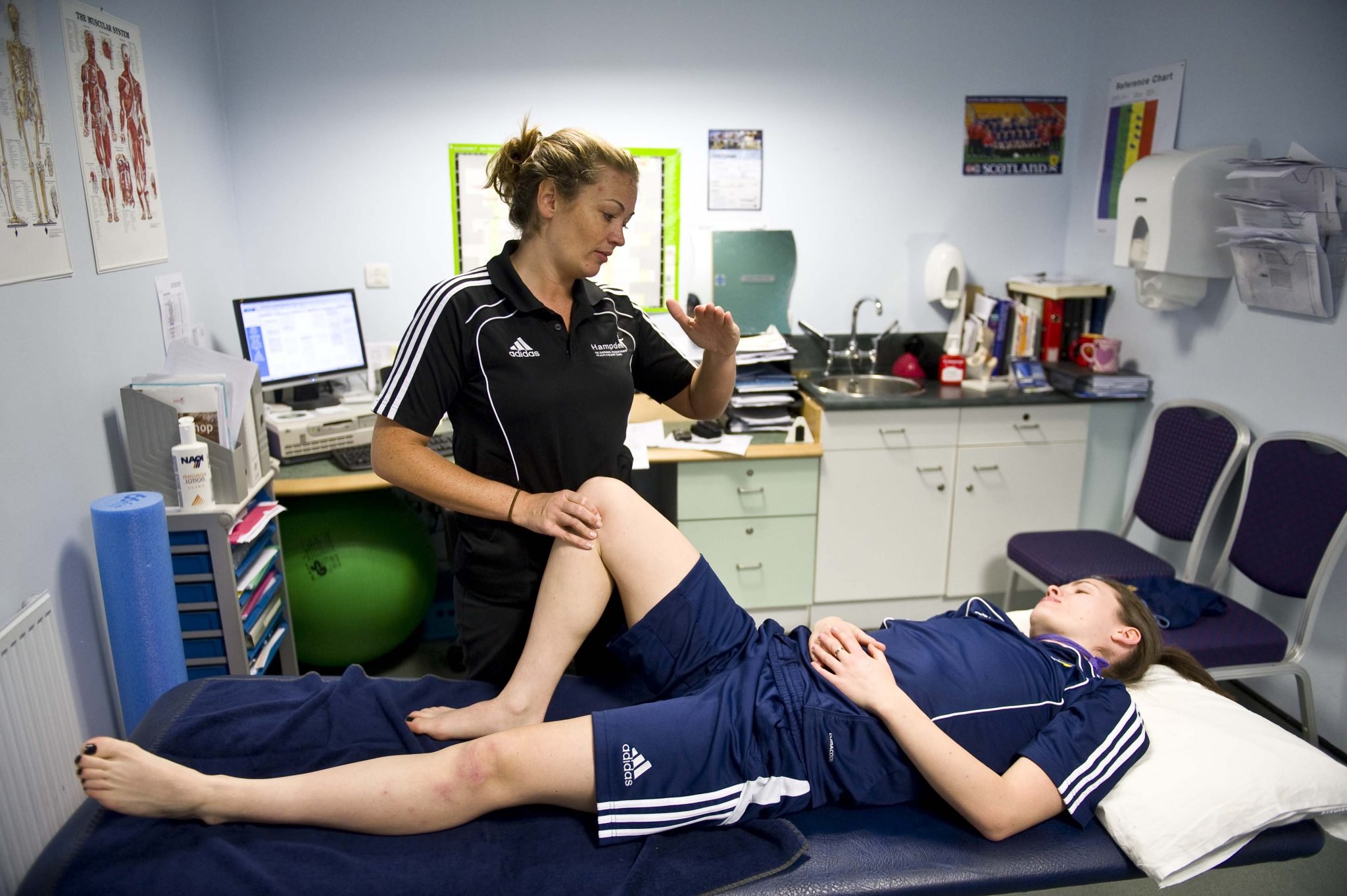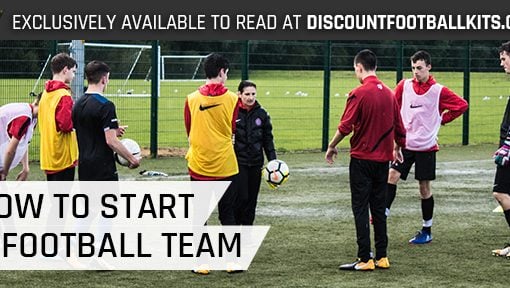How to become a football physiotherapist is a question we’re frequently asked. Contrary to popular belief, there isn’t actually a specific role known as a ‘football physio’. You would be a Chartered Physiotherapist who works in football. Becoming a sports physiotherapist is becoming more of a sort after career and we’re here to give you guidance and answer your questions.
It is important to note that you should ensure that you want to become a physiotherapist before thinking about football. Physiotherapy takes a lot of commitment and dedication, don’t expect sports physiotherapy to just be what you see on a Saturday, a lot of work is done in the week, away from match day situations.
The same amount of passion you have for sports must be equal, or if not even more, for the profession of physiotherapy itself. Sports physiotherapy is a growing area of work across the UK. Therapists work mainly in health and fitness clubs, private sports injury clinics, leisure centres, individual sports teams or for the NHS.
What’s involved?
Sports physiotherapists diagnose and treat sports injuries, help individuals to recover and advise them on how to avoid similar injuries in the future. They work with top-level professional sports people as well as people who play the sport recreationally.
Working with professional sports people, physiotherapists often work as part of a team with sports scientists, coaches and other healthcare professionals.
Within a football club, your activities may include:
- Keeping players match fit and examining, diagnosing and managing injuries.
- Reporting all injuries to the manager and coaching staff and provide updates on all player’s rehabilitation progress.
- Delivery of individual and squad-based injury prevention programmes based on screening, past medical history and injury trends.
- Pre-training management of players including strapping and taping and administration of treatment as required.
- Close liaison with the Club Doctor, Sports Scientists and other members of the team to optimise player medical care and performance.
- Implementing strategies to maximise player performance on the football field from a medical perspective.
- The examination and assessment of all new players prior to signing for the club.
- Be involved in clinical governance and maintain professional registration.
What qualifications do you need to become a physiotherapist?
To become a sports physiotherapist, it is necessary to have a physiotherapy degree which is certified by The Chartered Society of Physiotherapy to legally practice physiotherapy.
Entry requirements vary, but in England, Wales and Northern Ireland, minimum qualifications for a physiotherapy degree are three A levels at grade C or above, usually including biological science and/or PE.
Physiotherapy degrees are very intense, lasting three years’ full-time or four years’ part-time, including various placements. A degree is one essential component, not only for the training it provides but for gaining membership of the Chartered Society of Physiotherapists, the professional body for UK practitioners.
How to gain experience as a sports physiotherapist?
After leaving university, it’s now time to gain some experience so you can fully learn and develop the skills to become a top physiotherapist. It’s important to carry on with different training courses and over a period of time you’ll build up enough experience to then apply for more professional roles.
After gaining a degree from a university, it can be advised that you work within the NHS first. Not only does it give you a broad range of what’s involved within physiotherapy but also looks good on your CV.
Voluntary experience at your local football club is a huge step in the right direction but starting out it’s totally fine to gain experience at other sports clubs or athletics clubs if you’re not getting anywhere with the football clubs in your area.
Within most career paths, experience is just as important as a degree and that’s no different within sports physiotherapy. Don’t expect to get paid right away but take it as a bonus if you do. Be proactive in gaining experience, there is no one correct method; networking, sending emails, contacting local clubs etc. Use tools such as the internet and social media effectively and to your advantage.
It is critical to apply for roles where you have easy access to an experienced physiotherapist to advise you and provide some mentoring. Internships are great because you can also benefit from professional development sessions. If working alone for a local club is the best you can arrange it’s better than nothing but of course in that setting you lack support, professional development and you don’t get to build your professional network.
Many voluntary roles are advertised online through the Association of Chartered Physiotherapists in Sports and Exercise Medicine (ACPSEM) and the Sports and Exercise Medicine page on the Chartered Society of Physiotherapy (CSP) interactive page. Positions are also advertised on the UK Sport and respective sporting teams’ and organisations’ websites.
Also, some universities have placements within the sport so look for those if you are still a student. In addition, there are other organisations that have opportunities for both students and graduates to gain experience within sport e.g. British Universities and Colleges Sport. Gaining experience working with elite athletes is also vital. Getting access to professional footballers isn’t easy, but elite performers in other sports may be crying out for support.
Day in the life of a Sports Physiotherapist
There’s no real typical day for a sports physio because physios assess and treat injuries as they happen as well as trying to prevent them from happening again through bespoke training plans.
The working environment may be in specially-equipped private treatment rooms, exercise areas, swimming or hydrotherapy pools, sports centres, or even on the touchline of a football match in the rain.
How much does a physio earn?
A typical starting salary at the NHS can vary between £23,000 and £29,000. The NHS works on a band system where your band reflects your pay – the higher band you are, the higher the salary you will earn.
Sports physio salaries have a lot of depending factors, do you work private or public? Community-based or sports clubs? These factors impact how much you can earn.
What the Experts Say
We reached out to multiple physiotherapists, to talk to us about their experiences within their profession. Here’s what they had to say:
Chris Wilson – @React_physio
Q – What’s the best part of your job?
A – The best part of my job is knowing that people place trust in me to enable them to return to activities and sports depending on their individual goals. It is fantastic to be able to help people achieve their goals and as I don’t just see sports people some of these goals can be
Q – How did you get into physiotherapy?
Q – How does your typical day look like?
A – My days vary as I do clinical work regarding injury assessment and gym based rehabilitation, I am fortunate to have a gym on site at the clinic so we can do a lot of strength work and
Erin McGuire – @emsportstherap1
Q – What’s the best part of your job?
A – The best part of my job is seeing players come back from injury stronger & better & with a massive smile on their face! Extremely satisfying!
Q – How did you get into physiotherapy?
Q – How does your typical day look like?
A – My day could consist of players arranging to visit me outside of football hours for sports massage or treatment to prevent any niggles they may have become anything more serious. I usually arrive at training sessions half an hour earlier and start giving players a sports massage and then I use kinesio tape on a few of the players who may need or want this support. Following training sessions and games, I advise all players to sit in a 10-minute ice bath to aid recovery.













Yes l love it